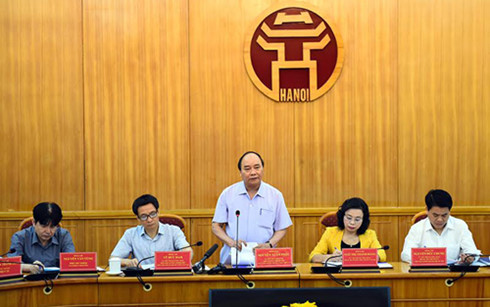Prime Minister: 'Close supermarkets if unsafe products are consumed'
That is the direction of the Prime Minister when working with the leaders of Hanoi city on strengthening the responsibility of State management of food safety.
On the morning of September 27, Prime Minister Nguyen Xuan Phuc chaired a working session with Hanoi leaders on the results of implementing Prime Minister's Directive 13/2016 on strengthening State management responsibility for food safety. Deputy Prime Minister Vu Duc Dam and representatives of ministries and branches also attended the meeting.
 |
| Prime Minister Nguyen Xuan Phuc works with Hanoi leaders. |
After more than 3 months of implementing Prime Minister's Directive 13, Hanoi has suddenly inspected nearly 700 establishments, discovered 176 establishments in violation and handled 170 establishments, fined over 1 billion 438 million VND. Hanoi has built a list of 225 safe vegetable and meat establishments with food safety certificates on the department's website. Hanoi is also receiving 5 specialized vehicles for rapid qualitative testing of food at wholesale markets and agricultural markets, to detect and warn of unsafe food.
According to representatives of the ministries, Hanoi has implemented Prime Minister's Directive 13 quite well, such as building and maintaining 60 food safety chains; effectively piloting specialized inspection of food safety and hygiene in 5 districts and 10 communes and wards according to Prime Minister's Decision No. 38/2015.
However, Hanoi still has 1,047 small slaughterhouses, so it is necessary to reorganize these facilities for more effective management. In Hanoi, there is still the use of additives and banned substances in food processing and preservation; the trade in fertilizers, pesticides of unknown origin, and banned substances in livestock farming is still complicated. In addition, the slaughter of livestock and poultry right at the market and street food is still a painful problem, unhygienic and unsightly.
Concluding the working session, the Prime Minister assessed that Hanoi has strictly implemented the Government's direction and Prime Minister's Directive No. 13, which shows that the awareness of the local authorities has been raised, which is the basis for raising the awareness of the people. Hanoi has arranged the staff to carry out the task of food safety management, including the establishment of the Steering Committee for food safety at all levels; and has promoted food safety to the authorities and people in many forms.
The Prime Minister highly appreciated the model of district, commune and ward leaders directly inspecting food safety in their management areas.
However, the Prime Minister said that the results Hanoi has achieved are only the beginning. Overall, the city's residents are still not completely satisfied with the current food quality. The Prime Minister noted that Hanoi must pay more attention to craft villages, small slaughterhouses, and food origins, including functional foods that do not have standards.
“Our sanctions are not clear, making it difficult to handle and enforce public duties. Testing work has not kept up with reality, the issue of announcing safe production processes has not been done well, the single-point food safety inspection agency has not done well; there are still many small-scale slaughterhouses; penalties are not strict. Therefore, you must try to overcome these shortcomings. From there, we will raise awareness in the whole city, actions in the whole city and consumption in the whole city to clean food, creating trust for the people of the capital,” the Prime Minister stated.
The Prime Minister also requested Hanoi to continue implementing the contents of Directive 13 of the Prime Minister, clearly defining the personal responsibilities of each local government official. Along with that, it is necessary to strictly manage poultry and livestock slaughterhouses; and strengthen the management of street food.
Prime Minister proposed:“We must resolutely direct the management of street food, decentralize and assign responsibility to the People's Committees of wards to better manage street food. The management of street food in Hanoi must be systematic, procedural, public, and clean, to introduce Vietnamese cuisine through Hanoi City. Therefore, we must investigate and strictly handle some parties, weddings, and meals that affect people's health. Some bread shops must also be strictly managed to ensure food safety for the people. If people eat bread from shop A or shop B and get stomach ache and get food poisoning, the owner of that bread shop must be investigated and punished. We must clarify such responsibilities, not allowing irresponsibility towards the people.”
Along with doing a good job of inspection, the Prime Minister directed the leaders of Hanoi City to promptly inform consumers about establishments providing safe and unsafe food; continue to build a clean food supply chain for the city with many models similar to Van Duc vegetable growing commune. Along with that, it is necessary to strengthen the inspection of establishments that are hot spots for food safety.
“Comrades must launch peak food safety inspections at markets and supermarkets in the coming time. If necessary, supermarkets can be closed if they sell unsafe products, clarifying the responsibilities of supermarket owners. Hanoi must also strengthen food safety control at craft villages producing confectionery, ham, sausage, and vermicelli in places such as Hoai Duc, Bac Tu Liem, and Thanh Tri,” the Prime Minister suggested.
At the meeting, the Prime Minister agreed to let Hanoi expand the pilot specialized inspection model to all districts, communes and wards to ensure synchronization in inspection and handling of food safety violations. The Prime Minister assigned relevant ministries and agencies to summarize the specialized inspection model in Hanoi for replication nationwide.
The Prime Minister assigned Hanoi City to study a rapid response force model to promptly detect and handle food safety violations.
According to VOV
